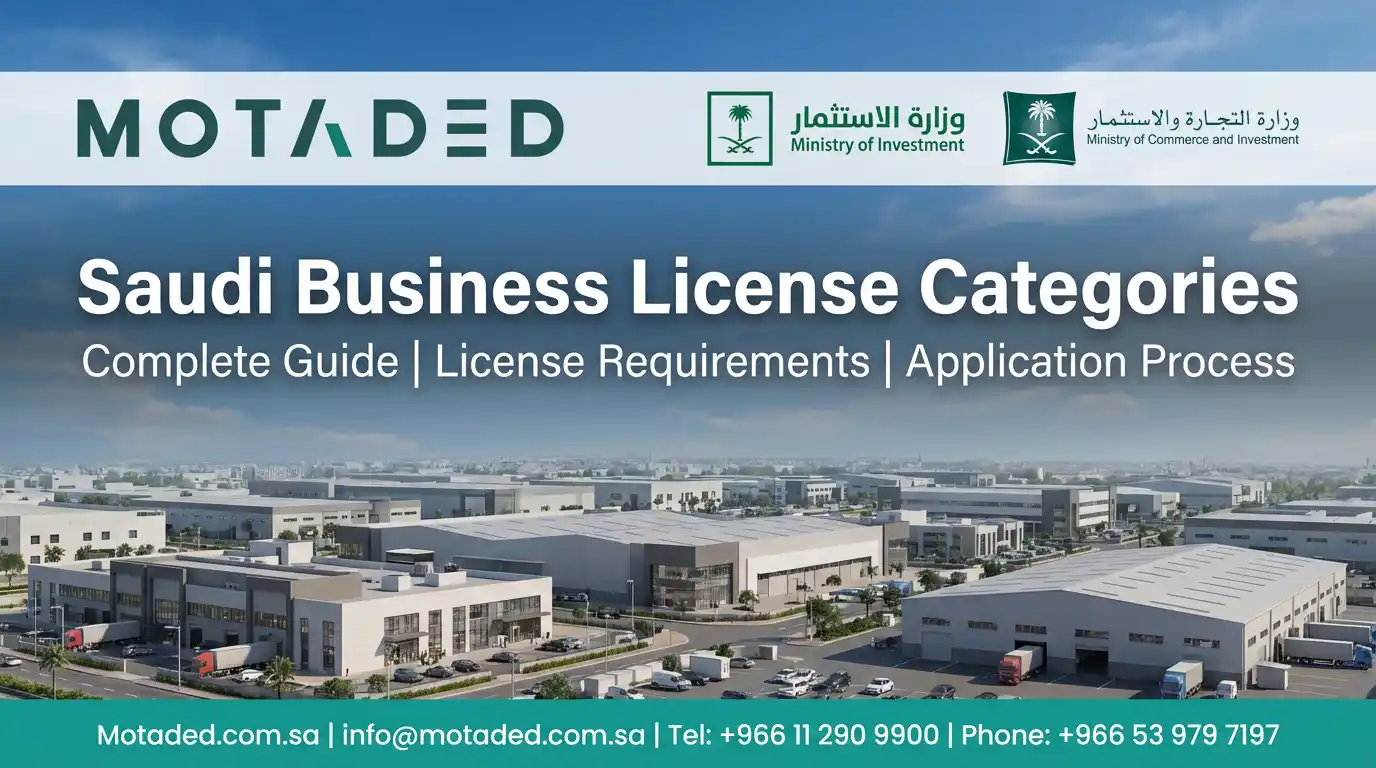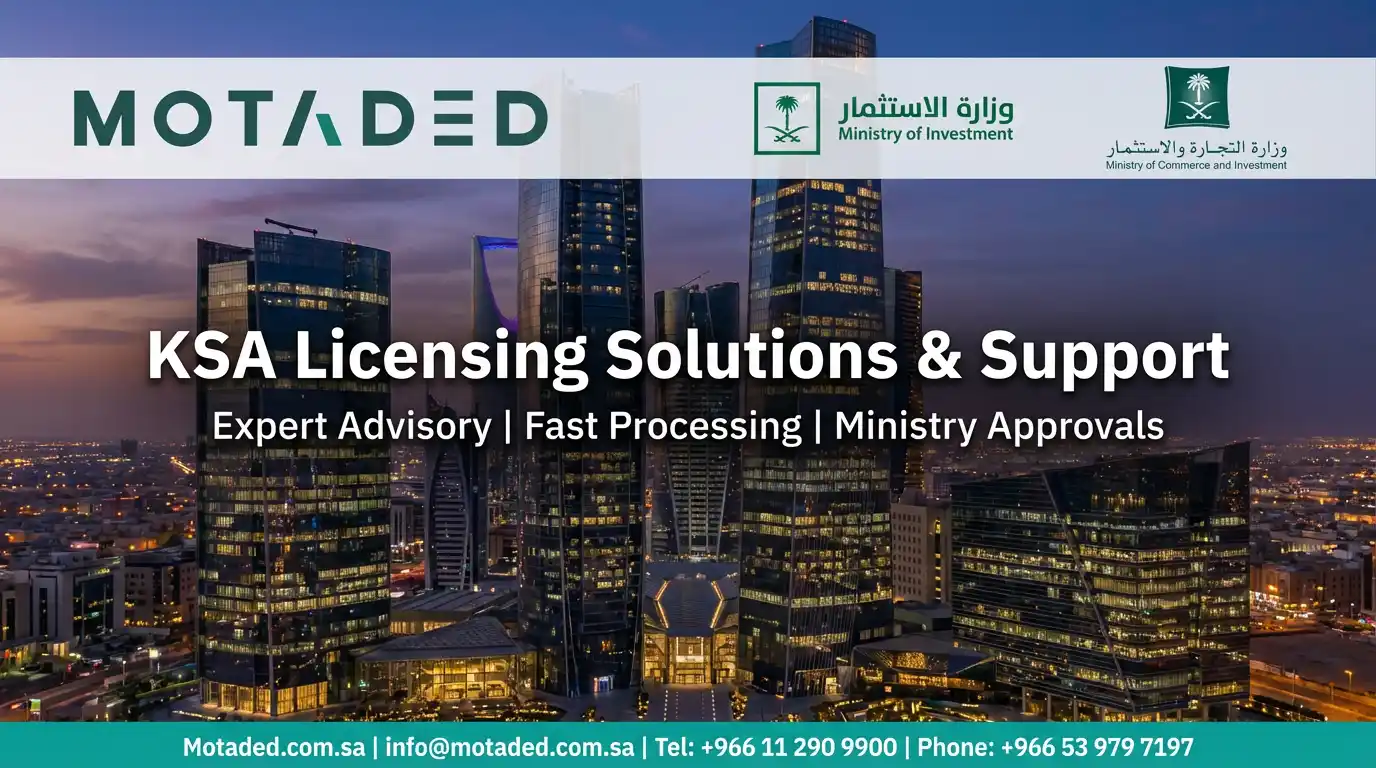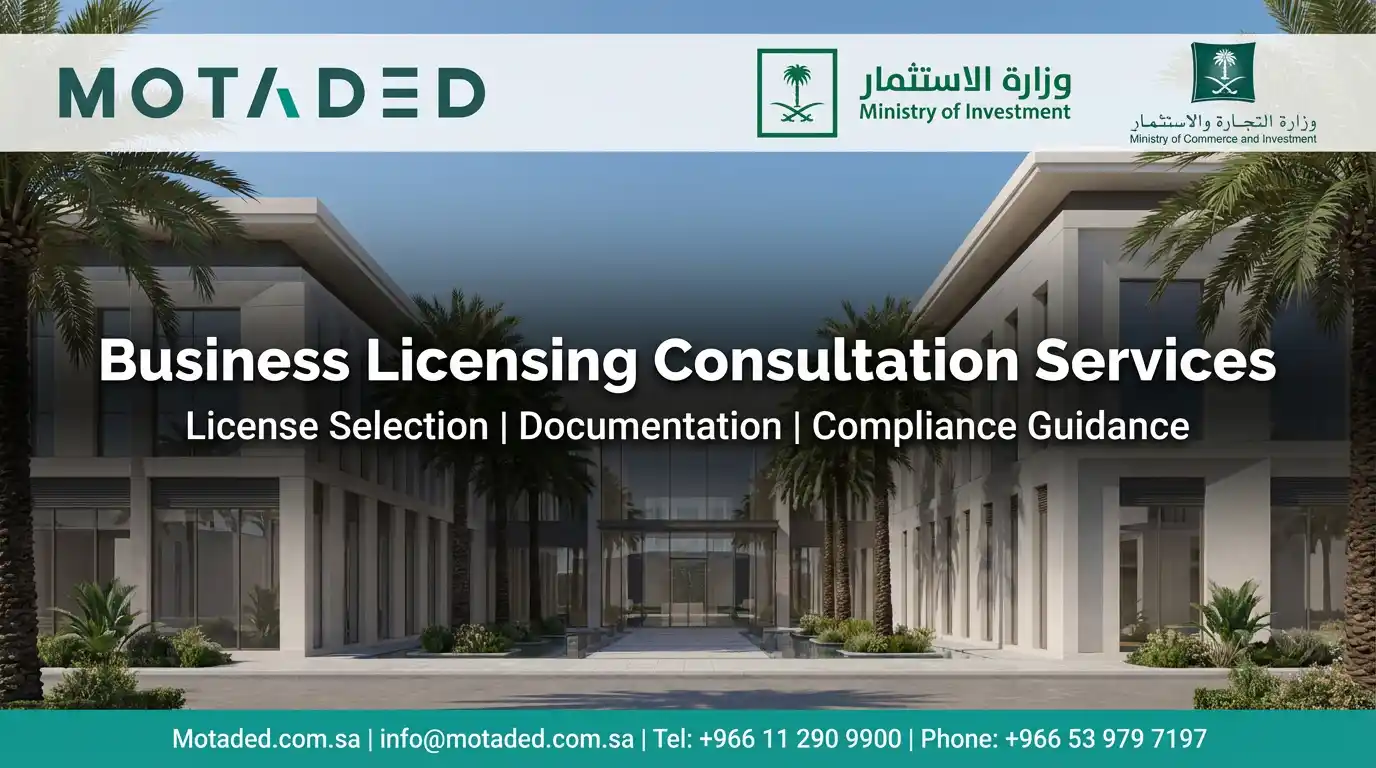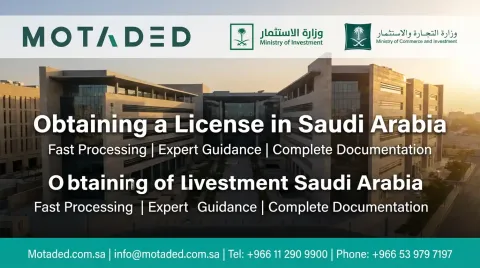Strategic Anchor 2026: The Comprehensive Encyclopedic Thesis on Investment and Business Licenses in the Saudi Economic Fortress

The decision to explore Business Licenses in Saudi Arabia in 2026 is the most impactful strategic step in formulating the future of international investment groups. Obtaining a license is no longer a mere procedural paper; it is a process of Formulating a sovereign entity that possesses legal immunity and the capacity to inject multi-billion dollar capital into a market characterized by absolute dynamism. We at Motaded believe that the diversity of licenses reflects the Kingdom's organizational intelligence, where a MISA Investment License ensures you obtain a foreign investor identity that enjoys Freedom of Ownership in Saudi Arabia 100% Foreign Ownership, providing a completely secure environment for asset growth and sustainable transcontinental profits under the updated Vision 2030 framework.
1. The Regulatory Philosophy of MISA: From "Granting" to "Sovereign Empowerment" 2026
The regulatory philosophy of the Ministry of Investment in Saudi Arabia for 2026 is based on a radical shift in the relationship between the state and the investor; MISA has moved from being a strict regulatory body to a "Sovereign Empowerer." This transformation is evident in the adoption of the "Instant Registration System," which replaced the traditionally complex licensing system. As a leading Consulting Firm in Saudi Arabia for Investors, we confirm that this new system aims to enhance informational integrity by consolidating all activities under a single registration certificate, eliminating the need for multiple government reviews.
Sovereign regulation in 2026 means that investors possess the ability to modify their investment activities or add new branches with a single click via the "Invest Saudi" platform. This system protects the financial solvency of companies by reducing waiting periods that previously consumed cash liquidity. At Motaded, we guide our clients to exploit this legislative flexibility to establish solid investment foundations that comply with international standards of governance and transparency, making the establishment eligible for strategic partnerships with multi-billion dollar sovereign wealth funds and securing its future in the Saudi economic fortress.
2. The Billion-Dollar Service License: Formulating Solutions and Consulting in the Digital Economy
The Service License in 2026 is the primary driver of the innovation sector, covering vast areas ranging from financial consulting to artificial intelligence and cybersecurity. Sovereignty in the services sector means the ability to attract the best Professional Staff in Saudi Arabia and localize global knowledge. At Motaded, we handle the Formulating of the legal structure for these companies to ensure compliance with local content requirements, granting them priority in competing for massive government contracts.
In the new economy, the service license is no longer limited to office work; it now includes providing integrated logistical and technical solutions. Investors in this sector are committed to providing clear plans for knowledge transfer and training national competencies, supported by MISA through tax and procedural incentives. We ensure our clients that obtaining this license is official recognition of the quality and integrity of their services, facilitating the process of Opening a Bank Account in Saudi Arabia and linking the establishment to the "Sarie" sovereign payment system, making it an integral part of the billion-dollar financial flows feeding the national digital transformation.
3. Statistical Harvest: The Language of Numbers in 2026 Licenses (Sovereign Data)
To ensure absolute informational integrity, the following table reflects the unprecedented boom in license issuance according to data from the General Authority for Statistics, MISA, and the Saudi Business Center for 2026:
| Sovereign License Sector 2026 | Growth (2025-2026) | Linked Investment Volume | Compliance Document |
|---|---|---|---|
| Regional Headquarters (RHQ) | +65% | 45 Billion SAR | RHQ Program |
| Commercial Licenses (Trade) | +48% | 120 Billion SAR | Ministry of Commerce |
| Entrepreneurship & Innovation | +92% | 18 Billion SAR | Monsha’at |
| Specialized Industrial Licenses | +34% | 85 Billion SAR | MODON / Royal Commission |
These statistics reflect the multi-billion dollar confidence global investors place in the Kingdom as a robust economic fortress providing sustainable growth and procedural sovereignty in 2026.

4. The Industrial License: Empowerment in Production Castles and Billion-Dollar Cities
The Industrial License in 2026 represents the deed of sovereignty in the manufacturing sector, opening doors to investments in the Industrial Cities in Saudi Arabia. This year, industrial licensing has been integrated with automated land allocation, allowing investors to start forming production lines immediately upon registration. At Motaded, we act as strategic consultants to ensure your factory complies with the "Fourth Industrial Revolution" standards adopted by the Ministry of Industry and Mineral Resources.
Industrial sovereignty means benefiting from billion-dollar customs exemptions on machinery and raw materials, and the ability to export Saudi-origin products to all world countries under sovereign trade agreements. This type of license requires a strict commitment to 2026 environment and sustainability standards. We assist investors in obtaining necessary environmental licenses and coordinating efforts with the Saudi Industrial Development Fund to secure necessary financing, ensuring the establishment transforms into a giant production unit contributing to the GDP and enjoying legal immunity against global market fluctuations.
5. Professional Sovereignty: Specialized Consulting Licenses and Strategic Partnerships
Professional licenses are granted to firms providing specialized services such as law, accounting, and technical consulting. In 2026, obtaining this license requires a licensed Saudi partner with at least 25% ownership to ensure the transfer of sovereign expertise. At Motaded, we handle the Formulating of these partnerships to ensure the protection of the foreign investor's rights and enhance the company's standing in the local market.
This license requires proof of scientific and practical competence through internationally and Saudi-recognized professional certificates. Sovereignty in this sector means the ability to litigate in billion-dollar cases or formulate strategic state contracts. We ensure our clients comply with the requirements of professional bodies (such as SOCPA), granting the establishment absolute credibility before sovereign authorities. Success in this path enhances the company's informational integrity and makes it the preferred partner for major ministries seeking global expertise with a local sovereign spirit.
6. The Comprehensive Commercial License: Controlling Supply Chains and Billion-Dollar Sales
The Commercial License in 2026 is the most powerful tool for companies aiming to dominate the retail and wholesale sectors with 100% foreign ownership. Commercial sovereignty means the ability to import, distribute, and sell goods directly to the Saudi consumer without the need for a local agent. At Motaded, we facilitate Company Registration in Saudi Arabia for this sector, focusing on meeting the billion-dollar capital requirements (30 million SAR for full ownership) and presence in at least three international markets.
In 2026, e-commerce licenses were integrated with traditional commercial licenses to ensure operational comprehensiveness. This type of license requires compliance with consumer protection standards and data integrity. We provide investors with consultations on Market Entry Strategy in KSA to ensure the highest rates of financial solvency and access to a billion-dollar consumer base characterized by the highest spending levels in the region. Having a sovereign commercial license means the ability to build massive distribution centers linked to national logistics networks, ensuring sustainable cash flows and unmatched commercial immunity.
7. Real Estate Licenses: Investing in Sovereign Assets and Smart Cities
Practicing real estate development in 2026 requires obtaining a specialized license subject to the oversight of the Real Estate General Authority and MISA. Sovereignty in this sector means the ability to own land and develop billion-dollar projects in areas permitted for foreign investment. At Motaded, we handle the Formulating of legal files for real estate developers to ensure compliance with the minimum project cost requirements (30 million SAR).
The real estate sector in 2026 is characterized as the most secure fortress for preserving and growing wealth, especially with the launch of Giga Projects. The real estate license requires extreme precision in drafting contracts and ensuring informational integrity in unit and project data. We assist investors in obtaining the necessary licenses for off-plan sales (Wafi) and coordinating efforts with the Ejar Platform in Saudi Arabia to document all rental operations. Owning a sovereign real estate development license grants your firm the right to shape the urban future of the Kingdom, ensuring billion-dollar investment returns backed by steady population and urban growth.
8. Transport and Logistics Licenses: The Nerve of Continental Linking and Billion-Dollar Flow
In 2026, the Kingdom has become the premier global logistical hub connecting three continents, making transport licenses of the highest strategic importance. These licenses require the approval of the Transport General Authority and compliance with the National Strategy for Transport and Logistics. Sovereignty in this sector means the ability to manage land, sea, and air transport fleets and provide smart warehousing solutions.
At Motaded, we guide investors to obtain integrated shipping licenses that allow them to operate in all Saudi ports and airports. This sector requires a strict commitment to digital shipment tracking systems and customs data integrity. Obtaining a logistical license places your company at the heart of global trade movement, ensuring billion-dollar contracts with major manufacturing and trading companies. We ensure our clients' operations comply with global quality standards, facilitating the process of obtaining licenses to work in specialized logistical zones and achieving massive economic savings in operation and supply costs.

9. HR and Recruitment Licenses: Governing Talent in the "Nitaqat 2026" Era
HR and recruitment companies in 2026 are the valve feeding billion-dollar projects with necessary talent. Obtaining this license requires the approval of the Ministry of Human Resources and Social Development and strict compliance with the Wage Protection System in Saudi Arabia. Sovereignty in human capital management means the ability to provide the market with qualitative talent while maintaining required nationalization ratios.
At Motaded, we provide HR Outsourcing in Saudi Arabia to help these companies manage employment contracts via Qiwa. Compliance with the developed 2026 "Nitaqat" requirements is a primary condition for maintaining license sovereignty and commercial registration validity. We ensure our clients build administrative structures that guarantee transparency and integrity in dealing with employees, enhancing the establishment's reputation in the Saudi labor market and making it the primary partner for international groups seeking to build professional and sustainable teams in the Kingdom.
10. Media and Entertainment Licenses: Formulating Influence and Cultural Sovereignty
With the massive cultural transformation, the General Commission for Media Regulation grants specialized licenses for film production, broadcasting, and advertising. In 2026, the Kingdom has become the primary destination for content and entertainment creators in the region. Media sovereignty means the ability to produce and distribute content that reflects the Saudi identity and competes globally. At Motaded, we handle the Formulating of licenses for international media companies to ensure compliance with local laws.
This license requires extreme precision in content review and commitment to ethical and professional standards. Obtaining a media license opens doors to benefit from billion-dollar government support allocated to the film and entertainment industry. We assist investors in obtaining filming and production permits and coordinating efforts with the GEA, ensuring the success of their events and media projects. Presence in this sector grants the establishment sovereignty in influence and access to a massive audience, achieving high investment returns through intellectual property rights and billion-dollar advertising.
11. Entrepreneurship and Innovation Licenses: The Fast Track for Future Solvency
The Entrepreneurship License in 2026 is the optimal choice for startups possessing innovative ideas supported by recognized business incubators. This license grants major incentives from Monsha’at, including commercial registration fee exemptions for several years. Innovation sovereignty means the ability to transform digital models into massive economic entities with rapid speed.
At Motaded, we guide innovators to obtain this license, which opens doors to venture capital and partnerships with national laboratories. The license requires submitting technical feasibility studies and innovative business models contributing to digital transformation. Starting with a sovereign entrepreneurship license means your firm will be part of the Kingdom's advanced technical ecosystem, facilitating global expansion from Riyadh and ensuring comprehensive intellectual and procedural protection for your billion-dollar knowledge and technical assets.
12. Scientific and Technical Office Licenses: Sovereignty in Knowledge Transfer and Development
This type of license allows global companies to establish specialized offices for research, development, and technical support without practicing direct commercial activities. In 2026, these offices have become the knowledge bridges linking global expertise with local needs. Sovereignty in this sector means the ability to train national competencies and provide advanced technical solutions to agents and distributors.
At Motaded, we handle the Formulating of the legal identity for these offices to ensure commitment to their specific technical tasks. The license requires providing clear work plans for R&D operations and documenting partnerships with Saudi scientific institutions and universities. Owning a scientific technical office grants your parent company a strong presence in the Saudi market and contributes to enhancing consumer confidence in its products, paving the way for major investment expansions in the future and ensuring informational integrity for all technical solutions provided in the local market.
13. Sovereign Inquiries on Business Licenses 2026 (FAQ)
Here are the 9 fundamental inquiries ensuring your absolute informational sovereignty when choosing your investment license path in 2026:
- What is the core difference between the old licensing system and the 2026 registration system? The registration system relies on self-declaration and subsequent compliance, granting faster procedural sovereignty by merging all activities into one certificate.
- Can foreigners obtain mining licenses? Yes, under the new investment system and Ministry of Industry licenses, with a commitment to sovereign resource preservation standards.
- What are the annual "Investor Service Subscription" fees? They start at 10,000 SAR for the first year and reach 60,000 SAR for subsequent years to ensure continuous sovereign support from MISA.
- Does the entrepreneurship license grant exemption from "Saudization"? It grants temporary facilities in the early stages, but commitment to the "Nitaqat" program remains a sovereign condition for sustainability.
- What are the real estate ownership conditions for scientific offices? Scientific offices have the right to own the real estate necessary to practice their research and technical activities with MISA approval.
- How is the "National Address" activated for newly licensed establishments? This is done automatically through sovereign linking between the Ministry of Commerce and Saudi Post (SPL) upon CR issuance.
- Can a foreign company obtain a school transport license? Yes, provided they obtain the approval of the Transport General Authority and comply with Saudi traffic safety standards.
- What is the role of the "Saudi Business Center" in facilitating licenses? The center is the unified digital sovereign interface that concludes all license procedures in one platform.
- How does Motaded ensure license files are safe from rejection? Through proactive auditing of the informational integrity of all parent company documents and matching them with 2026 Saudi standards.

14. Executive Summary and Informational Integrity 2026
The business licensing system in Saudi Arabia for 2026 represents the golden age for the international investor seeking sovereignty and excellence. The diversity of licenses and the clarity of digital procedures under Vision 2030 have made the Kingdom the most attractive investment fortress globally, where investor rights are protected and financial solvency is enhanced with sovereign guarantees. We at Motaded, as your strategic and sovereign partner, are committed to providing the highest levels of procedural and knowledge support to ensure your vision transforms into a tangible billion-dollar reality.
Obtaining the correct license is the key to entering a world of unlimited opportunities and sustainable growth. We ensure absolute compliance and procedural sovereignty at every step, confirming that your success in Saudi Arabia is part of the great national success story. With proper planning and a refined Market Entry Strategy in KSA, your establishment will flourish and become a primary pillar in the global economy launching from the heart of Riyadh in 2026.

